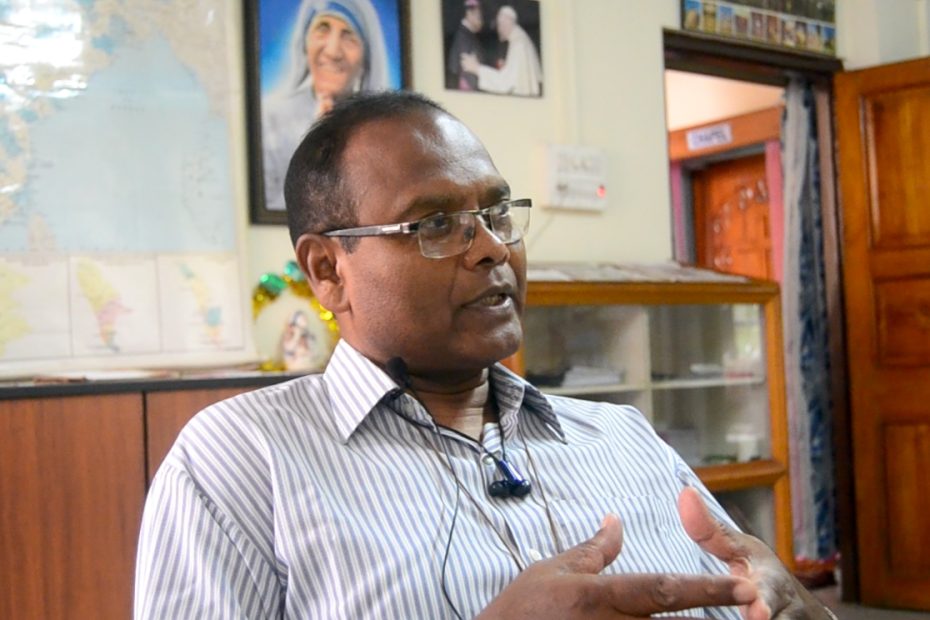Bishop Aind shares the need to create opportunities for the Adivasi and motivate them to envision a better future for themselves in Bagdogra.
RAOEN shares this 2019 Ecojesuit interview with Bishop Vincent Aind of the Diocese of Bagdogra, India on the challenges experienced by the Adivasi working in the Darjeeling tea (or chai) industry. In the tea gardens, the Adivasi are employed as indentured labourers with limited access to basic services and facilities such as clean drinking water and sanitation. This is a shared context in many parts of the world, such as the sugar industry in the Pacific Islands in the 1800s to 1900s. Bishop Aind also highlights the efforts of the diocese to engage the youth in reconnecting with the land and their identity, and accompanying them to see a vision for themselves in community.
Tea or chai is a staple part of daily life in India, the second largest producer of tea in the world. As the most popular drink in the country, tea does not only bring people together for refreshment around the table, but also in plantations away from their ancestral land. Such is the story of Adivasis or tribals in Bagdogra, a town in the district of Darjeeling, a world-renowned tea-growing region in West Bengal.
Of the 59,000 Catholics in the Diocese of Bagdogra, about 95% comes from an ancestry of Adivasis who migrated from Chota Nagpur three to four generations ago to work in the tea gardens, according to Bishop Vincent Aind. With most of the present generation of tribals born and raised away from the land, most are “practically cut off from their roots,” he said. The rest of the population is a mix of different other cultures, including those from nearby countries such as Nepal who also settled in Bagdogra for work in the tea gardens.
The bishop said the tea industry gave an assurance of livelihood to people, so they decided to settle near the tea belt. But the commercial tea industry started by the colonizers did not improve the lives of those who chose to leave their land for this assurance.
A bitter lesson
“They could always find a job at the tea gardens. That was the assurance. Though it may not pay very well, at least one can survive,” he said. “Only now, rather late, they are learning a bitter lesson. The tea gardens are not a permanent source of livelihood after all.”
Under the Plantations Labour Act (PLA) of 1951, employers are mandated to provide facilities for drinking water, accessible toilets maintained in sanitary conditions, medical services, education, and decent housing, among others, to their workers and their families. However, recent studies find that apart from a few exceptions, most tea plantation owners violate this law.
In the Global Business of Forced Labour, a two-year international study that the University of Sheffield published in May 2018, evidence showed that employers in the Indian tea industry systematically underpaid wages and underprovided legally-mandated essential services such as drinking water and toilets.
The Global Network for the Right to Food and Nutrition also released a fact finding mission report in 2016, A life without dignity – the price of your cup of tea: Abuses and violations of human rights in tea plantations in India, that included investigations in the tea gardens of Darjeeling and where workers have not even heard of the PLA, their rights, and the procedures for filing a grievance. They also do not elect their panchayat (village council) who is supposed to represent tribals in the government, the report showed.
“The present reality is deteriorating; even the so-called wages are not regularly paid. If they work for one month, they are paid for one or two weeks,” Bishop Aind said.
“Sometimes they are exploited both ways. The tea garden companies exploit them. Their political leaders also exploit them,” he added.
Because of this, many choose to migrate to other parts of India where they could land a higher paying job, contributing to around nine million annual inter-state migrants in the country, as estimated by the 2017 OECD Economic Survey of India. This leads to further marginalization, as migrants are often alienated from decision-making processes and are treated as outsiders, making them even more vulnerable to exploitation, the 2013 UNESCO study Social inclusion of internal migrants in India presented.
Hence, motivating the community to look forward to and strive for a better future has been difficult, according to the bishop. Even among the youth, the lack of motivation and low morale brought and exacerbated by different social and economic issues is apparent in the high dropout rates in schools.
“Dropouts are many, even in our good schools. They do not complete, or if they fail in the first attempt in their metric exam, they do not try again,” he said.
Finding motivation for Adivasi youth and community
The diocese works on helping the youth find their motivation through small afterschool programs called tuition centers scattered across the town. At present, there are 13 tuition centers operating in Bagdogra where students from private and public schools get remedial classes for lessons they do not understand. They are also encouraged to explore creative activities that help them discover and develop their talents.
These tuition centers also enrich learning in the youth through programs such as child parliament, moral education, and environmental awareness, Bishop Aind said.
“We also have our social center which is trying to inculcate a sense of responsibility towards nature in our people, not just in our Catholic community. It is trying to promote year after year the cultivation of more trees, and to work against soil erosion caused by sand mining in the riverbed. It is also trying to fight against the use of single-use plastic,” he added.
Aside from the sense of community promoted by these activities, the bishop said that culture also plays an important role in keeping people together and giving them a sense of hope.
“Culture plays a positive role in the sense of keeping them together, that ethnicity, the language they speak, and some of the cultural festivities – these work positively in maintaining them together. Their sense of belonging is there, so mutual support is there,” he said.
“At the same time, as a mixed society, there’s a lot of interchange, that is also quite good. A good bit of harmony is there. The mutual support in facing the economic challenges, the poverty, all that is there,” he added.
The bishop said there is still a lot of work to do to create opportunities for the people and motivate them to envision a better future for themselves. But despite the challenges in the land and their history of moving from place to place, he believes that the best thing to do now is to stay.
“I would dare to think we have to seek opportunity here, without migrating far away. While one may earn better – such as in Kerala where they can earn two to three times what they earn here – there are many other evil consequences of migrating. So I would like to think boldly that we have to seek opportunity here,” he said.


